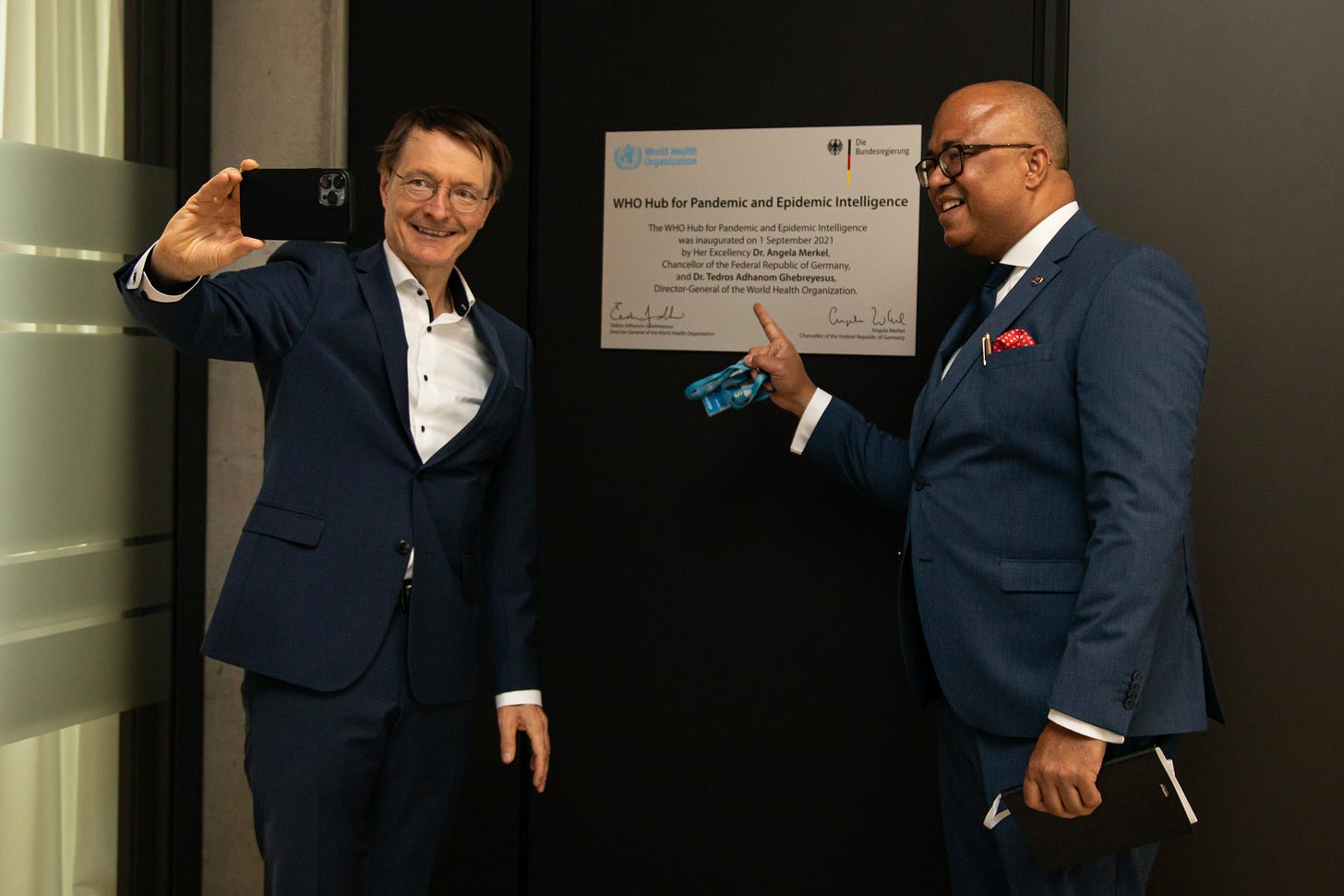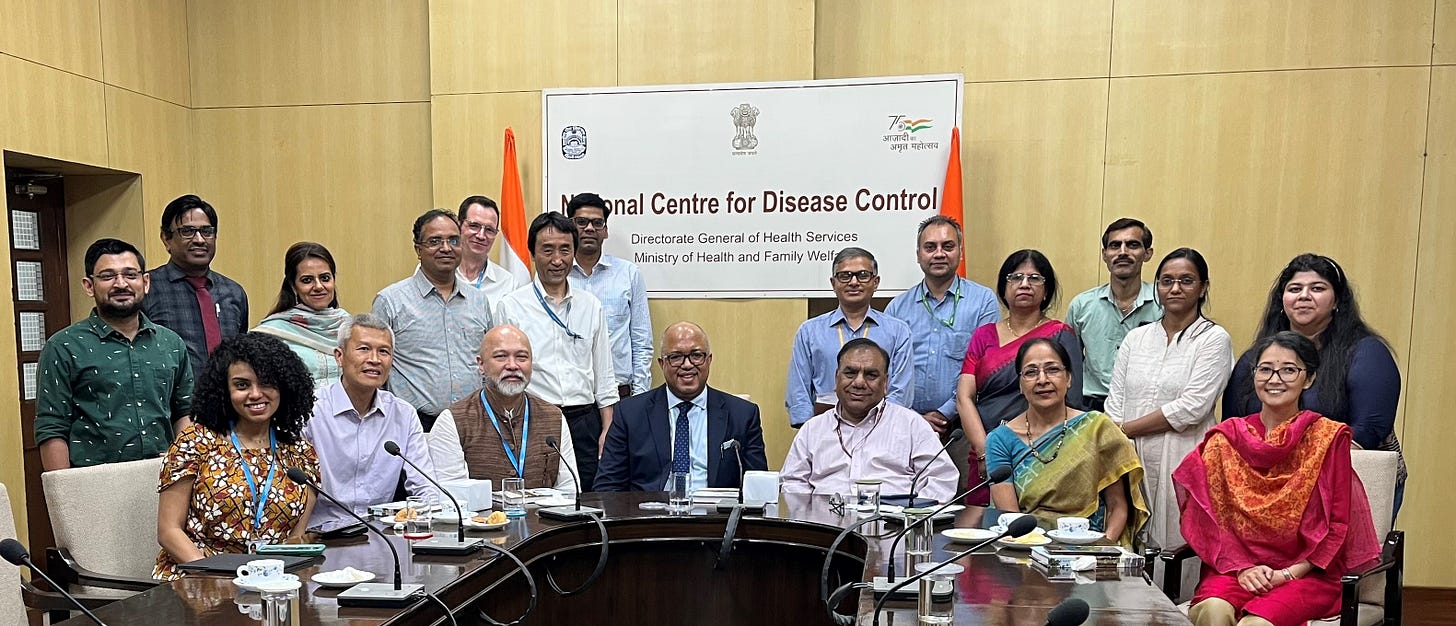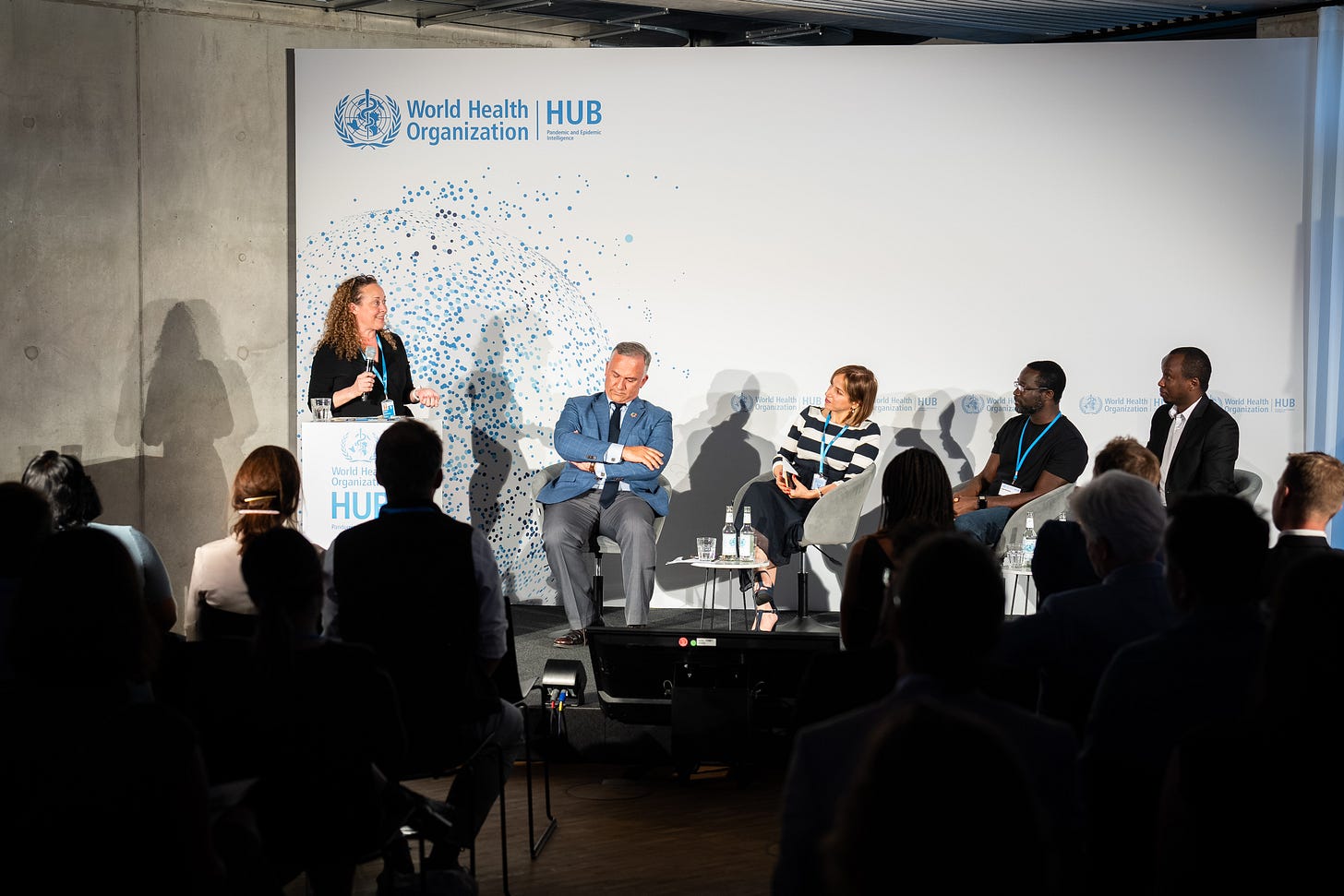Two years of the WHO Hub for Pandemic and Epidemic Intelligence
By Dr Chikwe Ihekweazu, Assistant Director-General, WHO
"It always seems impossible until it's done." – Nelson Mandela
Inauguration of the WHO Hub for Pandemic and Epidemic Intelligence in September 2021 with Angela Merkel, former Chancellor of Germany, and Dr Tedros Adhanom Ghebreyesus, Director-General of WHO © Steffen Kugler
Two years ago, on 1 September 2021, the World Health Organization’s Hub for Pandemic and Epidemic Intelligence was inaugurated. At its launch by WHO Director-General Tedros Adhanom Ghebreyesus and former Chancellor of Germany Angela Merkel, this new initiative to strengthen pandemic and epidemic intelligence through better data, better analytics, and better decisions across all aspects of public health emergencies was unveiled. This was a daunting challenge, as the world was in the middle of the COVID-19 pandemic that had led to millions of deaths and continues to affect the world. At that time, there was a strong political commitment and public demand for solutions to end the pandemic and to rebuild back better after the crisis. This was the driving force behind WHO’s establishment of the Hub, with the support of the Federal Government of Germany.
Two years later, the public health emergencies that threaten our world persist. At the Hub, we learn from these emergencies and are building the capacities the world needs to prevent and be better prepared for the next pandemic. We are proud to be a new and vital part of WHO’s Health Emergencies Programme.
Visit of the German Federal Minister of Health Prof. Dr. Karl Lauterbach at the Hub in August 2023 © Marcio Schimming
The COVID-19 pandemic revealed gaps in public health intelligence; the Hub has been working to address them since its inception. We base our work on the collaborative surveillance approach, which we formally launched during this year’s 76th World Health Assembly. Collaborative surveillance is the systematic strengthening of capacity and collaboration among diverse stakeholders, both within and beyond the health sector, with the ultimate goal of enhancing public health intelligence and improving evidence for decision making. It is a key element within WHO’s framework to strengthen the global architecture for health emergency prevention, preparedness, response and resilience. Our priority at the Hub is to advance collaborative surveillance for the world within the global public health ecosystem.
The work that we do at the Hub and throughout WHO would not be possible without our Member States and partners. With collaborative surveillance as our cornerstone, we have spent our first two years engaging with a diverse group of partners to re-imagine and co-create epidemic intelligence. We are working with Member States to establish national anchors of collaborative intelligence within their National Public Health Agencies (NPHAs). We recently launched the Health Security Partnership to Strengthen Surveillance in Africa initiative, a collaboration with Africa CDC, WHO AFRO, WHO EMRO and the Robert Koch Institute in Germany to support six NPHAs in Africa to accelerate the building and pooling of capacities for disease surveillance and epidemic intelligence. More will join as we scale up.
Meeting colleagues at the National Centre for Disease Control, India’s National Public Health Agency, during a WHO South-East Asia Regional office visit ©WHO
Another key initiative that reflects our commitment to collaboration is the International Pathogen Surveillance Network (IPSN). In May 2023, we launched the IPSN as a global network that brings together pathogen genomic surveillance actors to improve public health decision making. It includes global communities of practice to solve common challenges faced by Member States and partners in pathogen genomics; a country scale-up accelerator to amplify country voices and enable country exchanges; grant funding to promote equity and contribute to the global knowledge base; and an advocacy platform to keep pathogen genomic surveillance on the global public health agenda.
Launch of the International Pathogen Surveillance Network during the 76th World Health Assembly in May 2023 © Andrey ART
In the last two years, we have significantly expanded the Epidemic Intelligence from Open Sources (EIOS) initiative. This is a global collaboration to use publicly available information to strengthen public health intelligence by creating a unified approach to early detection, verification, assessment, and communication of public health threats from all sources and sectors. EIOS has expanded to 72 Member States across all WHO regions, and over 20 international and regional organizations.
We have also explored other areas of innovation. In 2023 we launched the first Open-Source Programme Office (OSPO) within the UN system to empower decision makers, public health professionals, and civil society to use open-source solutions for pandemic and epidemic intelligence. This could be a game changer for informing public health decisions. You can watch the fifth instalment of our Speaker Series on the launch of OSPO here.
Launch of the Open-Source Programme Office at the Hub in June 2023 © Stefen Kugler
I am proud of the significant progress we have made, none of which would have been possible without an incredible team, who have worked hard to move the Hub from an idea to what it is today. We continue to build a team with a diversity of expertise and experience with opportunities for continued growth. Our building in Berlin has been transformed from an architectural plan in 2021, to a construction zone in 2022, and now to a multi-functional space where we host experts from across disciplines, countries, and regions in our mission to promote collaboration and innovation.
Colleagues from the Hub with WHO Health Emergencies Programme leadership ©WHO
Investing in preparedness for the next health emergency, while the world was grappling with one, required courage and vision. I am thankful to Director-General Dr Tedros, the former Chancellor of Germany, and the Federal Government of Germany for their leadership and foresight in initiating this establishment. We also express our gratitude to our Member States and partners, whose trust and collaboration have enabled our rapid scale-up over the last two years.
In a globalised world, challenges such as climate change and antimicrobial resistance will bring about new health risks and expose different geographies to existing ones. To create a safer world in the face of public health emergencies, the Hub must go beyond strengthening the public health emergency capabilities of each National Public Health Agency to also connect them with each other and with other research and specialized institutions.
In the years ahead, we will continue to build on the partnerships and progress achieved over the last two years. We remain committed to the Hub’s original goals of contributing to global change and resilience. This means we will continue to facilitate collaboration among Member States through a shared approach to collaborative surveillance. We will reinforce these connections by working closely with national and regional public health agencies as well as other partners.
Although having strong capacities in individual Member States and NPHAs represents significant progress, lasting and equitable change will be realised when Member States accelerate their levels of collaboration to achieve the highest possible level of global resilience and agility. Together we can meet the challenges of our interconnected world and shape a safer future, one where NPHAs are interconnected and proactive, collecting, analysing, and sharing relevant data for national, regional, and global health security.








